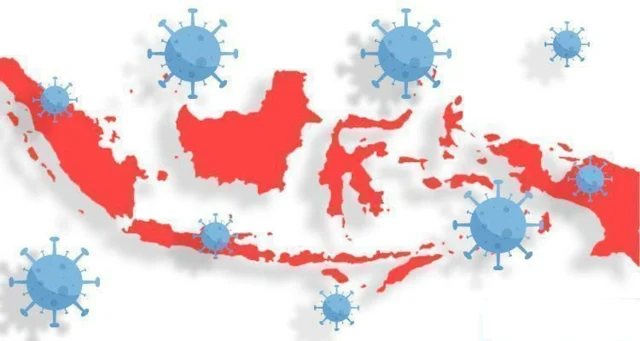By: Mutiara Romadhon*
International Nursing Student of Jenderal Soedirman University, Indonesia
On March 11, 2020, WHO declared Covid-19 as a pandemic that has infected the whole world. Covid-19 is a disease caused by the corona virus. This disease belongs to a new type that was discovered in 2019 and has never been identified in humans before. The case of the corona virus appeared and attacked humans for the first time in the province of Wuhan, China. Until May 2021, The Government of the Republic of Indonesia has reported 1,816,041 positive confirmed cases of Covid-19 and 50,404 deaths (CFR: 2.8%) related to Covid-19 were reported and 1,663,998 patients have recovered from the disease.
The recommended efforts in preventing the spread of this infection are to apply cough and sneeze etiquette, wash hands frequently with soap, put on masks, and preserve distance. The action to prevent Covid-19 that have been established will not run until the community is equipped with good knowledge, attitudes and skills in its implementation. In addition, one of the main factors that affect health, is the behavioral factor. There are three domains of behavior, namely knowledge, attitude, and practice.
Based on research from Moudy and Syakurah (2020) there are still differences in the level of knowledge Indonesian people about Covid-19. Knowledge of various topics related to Covid-19 is widespread among 26.9% - 96.6% of the Indonesian population. The lowest percentage of items reported was found in the Covid-19 recovery question and the highest percentage was found in the question of the use of masks. In addition, a small number of respondents still believed wrong information, which ranged from 0.4%-29.3% of respondents.
One of the factors that affect it is the level of education, the higher a person's level of education, the higher the knowledge possessed. In addition, the level of education will also affect how a person receives information and knowledge. Other factors are occupation, age, environmental factors and socio-cultural factors.
In an effort to prevent the spread of Covid-19, positive community behavior, namely being calm, being careful, and increasing efforts to maintain health plays a very important role. In Moudy's and Syakurah research (2020) show 49.2% of respondents fall into the category of positive attitudes.
This behavior is influenced by many factors, such as knowledge, perception, emotion, motivation, and environment. In the case of Covid-19 in Indonesia, one of the basics needed in preventing Covid -19 behavior is public knowledge.
Knowledge determines behavior because it helps understand reality to form beliefs, provide the basis for decision making, determine behavior towards certain objects, and influence human behavior. Once someone has information about Covid-19, then he or she is able to decide what they should do about Covid-19.
This is also shown by as many as 17.9% of respondents who have good knowledge have good actions regarding Covid-19, namely (82.1%). (Moudy and Syakurah, 2020). Individuals with bad knowledge have a risk of having bad actions by 6.674 times compared to individuals with good knowledge.
In creating good public knowledge that leads to a good attitude to prevent Covid-19, it requires support from all parties. For one thing, the government also needs to publish open, accurate and comprehensive data regarding the conditions for the spread of Covid-19. Open data on the distribution of the pandemic can increase public confidence in government and generate societal stability.
On the other hand, data that is hidden from the public will actually create public distrust in following the government's appeal. There is control over the circulating false news. Due to the wide variety of knowledge, efforts to increase public knowledge about Covid-19 need to be continuously improved. Efforts can be made in various ways, such as counseling by health workers.
Knowledge is important because acceptance of new behavior will be more lasting if it is based on knowledge, while the behavior will not last long without being based on knowledge. By increasing public knowledge and awareness of certain health risks, it will result in positive behavior change.
One of the main things related to public knowledge that must be improved is the clarification of various fake and false news about Covid-19 like the latest is about vaccinations and mutations. This is done to change people's perceptions that are already wrong. Provision of specific, valid, and well-targeted knowledge can improve community behavior in preventing Covid-19 infection.
REFFERENCE
Moudy,
J & Syakurah, R.A. (2020). Pengetahuan terkait Usaha Pencegahan Coronavirus
Disease (COVID-19) di Indonesia. HIGEIA, 4(3), 333-346. https://doi.org/10.15294/higeia/v4i3/37844
Purnamasari,
I dan Raharya A.E. (2020). Tingkat Pengetahuan Dan Perilaku Masyarakat
Kabupaten Wonosobo Tentang Covid -19. Jurnal Ilmiah Kesehatan, 33-42.
RM. (2021). Situasi Terkini
Perkembangan Coronavirus Disease (COVID-19) 31 Mei 2021. INFEKSIEMERGING
accessed from https://infeksiemerging.kemkes.go.id/situasi-infeksi-emerging/situasi-terkini-perkembangan-coronavirus-disease-covid-19-31-mei-2021#
Sari D.P
& ‘Atiqoh N.S. (2020). Hubungan Antara Pengetahuan Masyarakat Dengan
Kepatuhan Penggunaan Masker Sebagai Upaya Pencegahan Penyakit Covid-19 Di
Ngronggah. Jurnal Ilmiah Rekam Medis dan Informatika Kesehatan, 10(1),
52-55.
Utami
R.A, Mose R.E, & Martini. (2020). Pengetahuan, sikap dan keterampilan
masyarakat dalam pencegahan covid 19 di provinsi DKI Jakarta. Jurnal
Kesehatan Holistic, 4(2), 68-77. DOI: 10.33377/jkh.v4i2.85










Tidak ada komentar:
Posting Komentar
Yuk tulis kesanmu setelah membaca tulisan di atas. Masukan, kritik, dan saran. Terima kasih. Salam literasi.